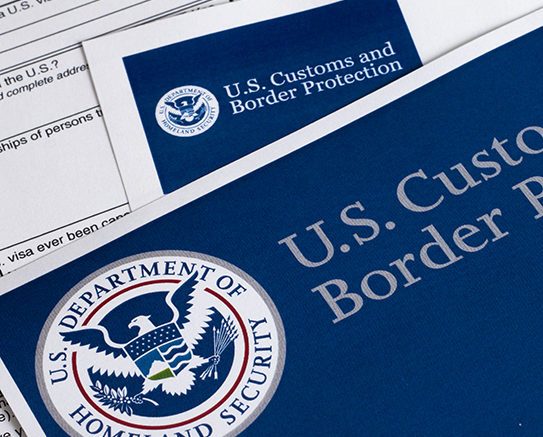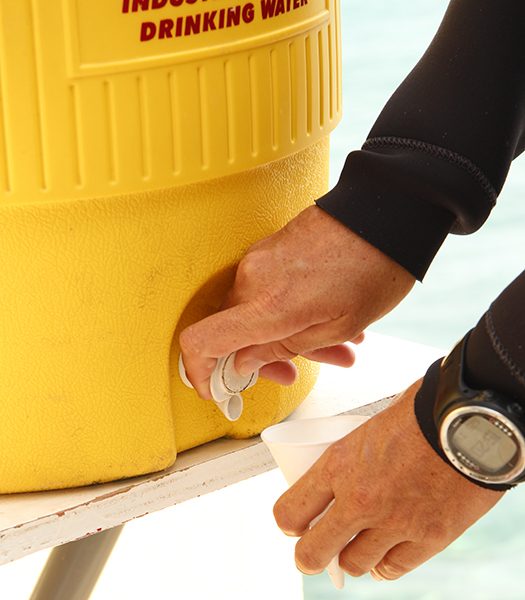TRAVEL AND
HEALTH ADVICE
FOR CUSTOMERS

DIVE OPERATORS WHO OFFER EXPERIENCES in remote and less-developed locations must strike a sensible balance between offering sufficient practical advice and deterring the more timid of their potential dive clients.
New or less-well-informed divers will need enough information to be able to plan for their health and safety and gain an understanding of local financial and customs practicalities.
Discovering that customs requires specific documentation for dive gear on arrival, that one should not walk around in public without culturally accepted clothing, or that local health care facilities are not what you are accustomed to (or are even hazardous), could easily lead to negative reviews online.
Providing sensible advice to visitors will make them better prepared, especially when traveling to far-flung locations. This is essential to ensuring repeat business. Relying on travelers’ common sense does not always work.
ENDEMIC DISEASES
Vaccination requirements vary greatly among countries, and one cannot assume that visitors are automatically immunized against diseases such as yellow fever or typhoid. While malaria is perhaps expected in some regions, we know that some of the prophylactic medications are not compatible with diving.
Ensure that clients are alerted to local and regional vaccination requirements, that they consult with a travel medicine specialist as needed, and travel with any required documentation.
VECTORBORNE DISEASES
While some local insects may simply be annoying and local residents may have learned to just live with them, we know that other insects can cause more serious conditions such as Zika, dengue, chikungunya, and leishmaniasis to name a few. Although there are no prophylactic medications for these, when used properly, bed nets, repellents, and adequate clothing can be very effective.
Advise clients in advance that they should bring lightweight long-sleeve shirts and trousers with closed-toe shoes for the evenings. Locally effective repellents and netting may assist in making them in feeling more secure.
LOCAL FOOD AND WATER
Among the most common travel ailments are “travelers’ diarrhea” and food poisoning. Once again, locals may be immune to contamination of fresh produce and water whereas the visitor might react poorly. Travelers will of course wish to steer clear of any nasty disorders or unpleasant experiences that prevent them from being able to dive.
A dive center should ensure that safe, potable water is available on the premises and aboard boats. If food is served on any occasion, strict sanitary measures must be adhered to. Fruits and vegetables served fresh should be washed in drinking water.
AVAILABILITY AND COST
OF HEALTH CARE SERVICES
Local health care services may not be able to meet the needs of clients with preexisting medical conditions or handle some emergencies including diving injuries. In some areas, providers may charge visitors much higher fees for service, ask for cash payment in advance, require excessive payment guarantees, or not accept valid insurance policies.
Dive businesses familiar with local practices, constraints and acceptable methods of payment should inform clients about this in advance. This will help ensure that travelers purchase suitable health insurance policies and bring cash (or other locally accepted means of payment) as well as sufficient supplies of their medications. It is wise to bring more medication than is needed in case of an extended stay, whether by choice or for some unavoidable reason.


TRAVEL AND HEALTH
ADVICE FOR CUSTOMERS
Dive operators should advise customers (and other visitors) about health, safety,
financial, and other relevant considerations before they make reservations and
travel plans for a dive excursion.
Excessive advisories may deter some customers from making a reservation; however,
insufficient advisories may expose operators to liability claims for nondisclosure of known or expected risks.
Dive operators should strike a suitable balance between over- and under-admonishments,
being mindful of the health and safety of all parties and of the risks and benefits
involved in any course of action.
HEALTH AND SAFETY
ELEMENT
Insurance
RISKS
Dive operators may be exposed to liability, as well as potential negative publicity, if injured customers cannot be treated or evacuated because they have neither sufficient resources to pay directly
for their medical care and/
or evacuation.
Operators may face the prospect of business disruption if they have to cease activities while evacuating an injured customer.
Operators may also be liable for the cost of emergency services if a customer receives care but is unable to pay for it.
These considerations may be especially applicable if a dive excursion to a remote area or a liveaboard excursion is sold as a package deal.
RECOMMENDATIONS
Dive operators should advise all customers to carry adequate insurance and to specifically check these factors of their coverage:
- that their health insurance policy covers injuries incurred while diving (and whether that coverage is subject to depth restrictions);
- that their health insurance policy or a separate policy covers medical evacuations;
- that they also consider carrying general travel insurance; and
- that none of their policies include geographical limitations relevant to their intended excursion, especially regarding evacuation, which may be very expensive or even impossible in some remote areas.
Some dive operators may need to purchase special insurance products to cover their customers, such as if their operation is vulnerable to specific risks that may not be covered by typical dive and travel insurance products.
DAN Customer Service
Mon–Fri, 8:30 a.m. – 5 p.m. ET
+1 (919) 684-2948
+1 (800) 446-2671
Fax: +1 (919) 490-6630
24/7 Emergency Hotline
In event of a dive accident or injury, call local EMS first, then call DAN.
24/7 Emergency Hotline:
+1 (919) 684-9111
(Collect calls accepted)
DAN must arrange transportation for covered emergency medical evacuation fees to be paid.
Medical Information Line
Get answers to your nonemergency health and diving questions.
Mon–Fri, 8:30 a.m. – 5 p.m. ET
+1 (919) 684-2948, Option 4
Online: Ask A Medic
(Allow 24-48 hours for a response.)
